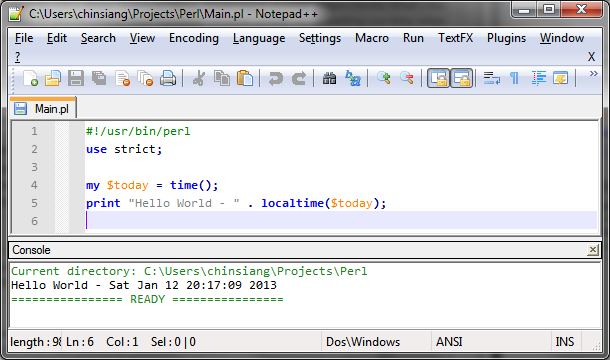It is very common that not all the application will purge their old log files. Hence, you need to purge the old log files (backup ZIP files) before the system runs out of space.
Normally, we will purge the old files based on date. If the application does not run for long time, all the log files will be purged. Sometime, we would like to keep the minimum number of old log files to find out when it was run.
The script will be based on the following conditions:
1.
Keep Minimum Number of Copies - If the application does not run, we will keep the log files even they are few months old. It will not proceed to check the keep days if failed to meet this condition.
2.
Keep Days - It will remove all the logs that older than the specify days. To keep up to today log, specify zero day.
#!/usr/bin/perl
# $Id: purge_files.pl,v 1.4 2012/04/19 13:38:55 chinsiang Exp chinsiang $
#
use strict;
use Getopt::Long;
use POSIX;
use File::Spec;
use File::Glob;
my $VERSION = "1.0";
# 0 = keep today, 1 = keep today & yesterday, etc
my $BACKUP_DAYS_TO_KEEP = 14;
# Specify number of copies to keep. If less the this number,
# housekeeping will be aborted.
my $BACKUP_COPY_TO_KEEP = 10;
my $FILE_PATTERN = '*.log';
my %option;
die unless GetOptions(
"file-pattern=s" => \$option{'file-pattern'},
"backup-copy=i" => \$option{'backup-copy'},
"keep-days=i" => \$option{'keep-days'},
"test" => \$option{'test'},
"verbose" => \$option{'verbose'},
"help" => \$option{'help'},
);
if (defined( $option{'help'} )) {
print_usage();
}
if (!defined($option{'file-pattern'})) {
$option{'file-pattern'} = $FILE_PATTERN;
}
if (!defined($option{'backup-copy'})) {
$option{'backup-copy'} = $BACKUP_COPY_TO_KEEP;
}
if (!defined($option{'keep-days'})) {
$option{'keep-days'} = $BACKUP_DAYS_TO_KEEP;
}
if (!defined($option{'test'})) {
$option{'test'} = 0;
}
purge_files($option{'file-pattern'},
$option{'keep-days'},
$option{'backup-copy'},
$option{'test'},
$option{'verbose'});
##############################################################################
# Purge the files
sub purge_files() {
my $file_pattern = shift;
my $keep_days = shift;
my $backup_to_keep = shift;
my $test = shift;
my $verbose = shift;
my $DAY_IN_SECONDS = 86400;
my %files = get_sorted_files($file_pattern);
my $file_count = scalar(keys(%files));
my $now = time();
my $delete_time = $now - ($DAY_IN_SECONDS * $keep_days);
# Adjust to localtime 12am
$delete_time -= (($delete_time % $DAY_IN_SECONDS ) + tzoffset());
if ($verbose) {
print "Delete file older than "
. strftime("%Y-%m-%d %H:%M:%S", localtime($delete_time)) . "\n";
}
if ($verbose) {
print "Found files\n";
my $index = 0;
foreach my $file (sort { $files{$a} cmp $files{$b} } keys %files) {
$index++;
printf("%2d. %s %s\n",
$index,
$file,
strftime("%Y-%m-%d %H:%M:%S", localtime( $files{$file} ))
);
}
}
foreach my $file (sort { $files{$a} cmp $files{$b} } keys %files) {
my $file_modified = $files{$file};
if ($file_count > $backup_to_keep) {
if ($file_modified < $delete_time) {
$file_count--;
if ($test) {
print "Test: Delete $file, "
. "Modified: "
. strftime("%Y-%m-%d %H:%M:%S", localtime($file_modified))
. "\n";
}
else {
if (unlink($file) > 0) {
print "Deleted: $file, "
. "Modified: "
. strftime("%Y-%m-%d %H:%M:%S", localtime($file_modified))
. "\n";
}
}
}
}
else {
# Exit the loop
last;
}
}
}
##############################################################################
# Get sorted files into a hash table.
sub get_sorted_files {
my $path = shift;
my $regex = shift;
my @files = glob($path);
my %hash = ();
foreach my $file (@files) {
$hash{$file} = (stat($file))[9];
}
return %hash;
}
##############################################################################
# Find the timezone in seconds.
sub tzoffset {
my $t = time();
my $utc = mktime(gmtime($t));
my $local = mktime(localtime($t));
return ($local - $utc);
}
##############################################################################
# Print usage
sub print_usage {
my $usage =<<EOF
DESCRIPTION:
Purge old records
OPTIONS:
--[f]ile-pattern File pattern in regex to purge. (Default: $FILE_PATTERN)
--[b]ackup-copy Minimum backup copy to keep. (Default: $BACKUP_COPY_TO_KEEP copies)
--[k]eep-days Number of days to keep.
0 = Today, 1 = Today & Yesterday, etc.
(Default: $BACKUP_DAYS_TO_KEEP days)
--[t]est Test run without purge the files.
--[v]erbose Increase verbosity.
--[h]elp Show this help text.
EXAMPLE:
\$ $0 --keep-days 10 --backup-copy 1 --file-pattern "~/tmp/*log" --v
EOF
die($usage);
}
__END__


